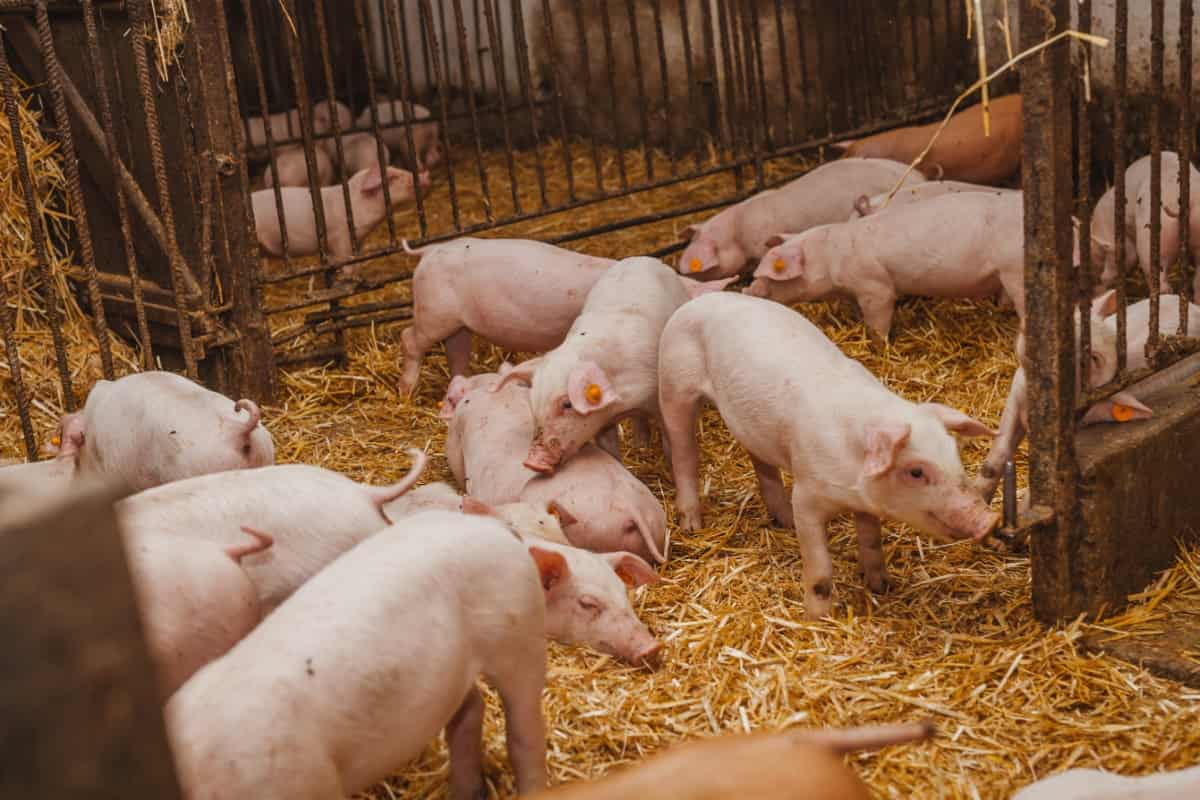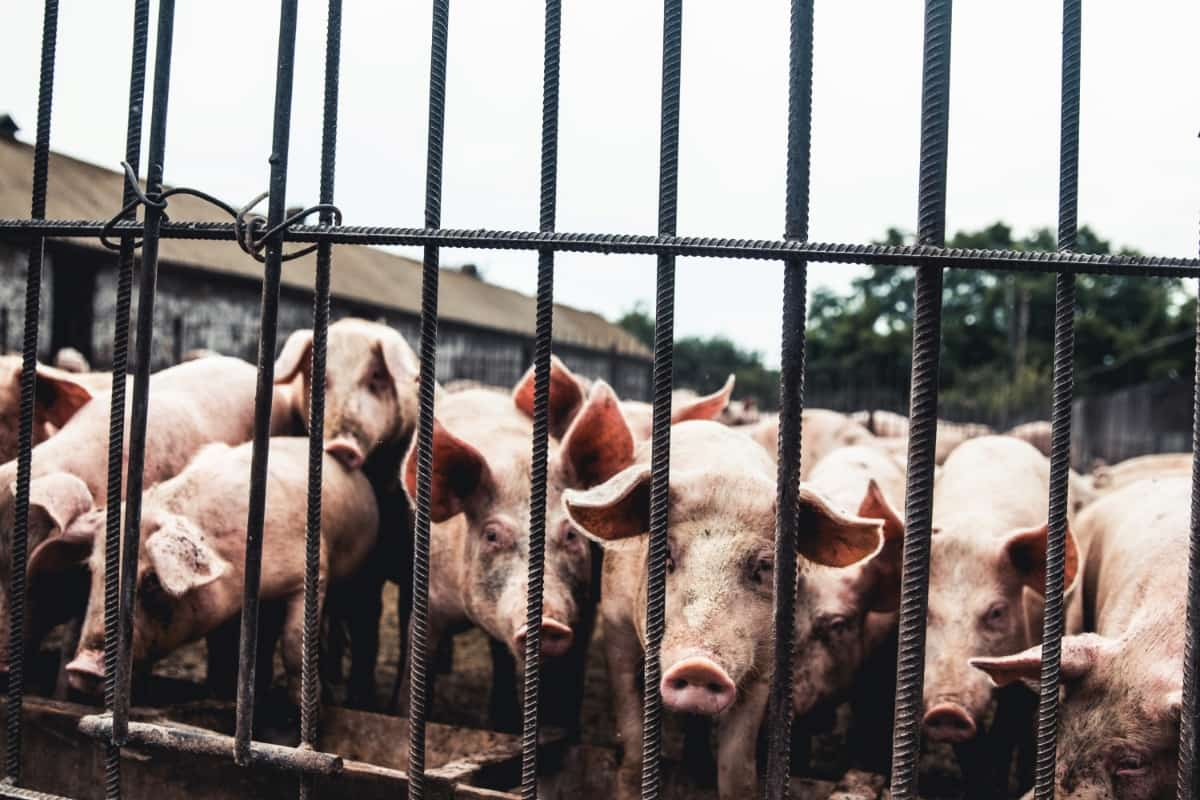Nigeria’s pig farming industry is thriving with considerable potential for investors and farmers. The industry is widely recognized for its profitability and significant economic contribution. Pigs have a high reproduction and growth rate, excellent feed conversion efficiency, and robust market demand, making pig farming a viable and lucrative business proposition.

However, starting a pig farming business in Nigeria demands careful planning, strategic implementation, and a comprehensive business plan. Here we learn about pig farming business in Nigeria, including selecting the appropriate pig breeds, farm set-up, feed management, health care, and marketing strategies.
Nigeria Pig Farming Business Plan
Pig Breeds
Choosing the appropriate pig breed is crucial to the success of your pig farming business. The selection of pig breeds will depend on the local climate, disease resistance, growth rate, and weight gain potential. Nigeria’s most popular pig breeds include the Large White, Landrace, Duroc, Hampshire, and local breeds. The Large White, known as the Yorkshire, is renowned for its high-quality meat and excellent reproduction capabilities.
On the other hand, Landrace pigs are known for their large litter size and exceptional mothering abilities. Duroc pigs are valued for their excellent growth rate, feed conversion efficiency, and high-quality meat. Hampshire pigs are smaller but are prized for their lean meat. The local Nigerian pigs have adapted well to the local environment and are resistant to several diseases, making them suitable for farming.
Farm Set-Up
Setting up a pig farm requires a substantial initial investment. The size and design of the farm should align with your business objectives, the number of pigs you plan to rear, and the available resources. Pig farming infrastructure includes pigsties or pens, feeding troughs, water supply systems, waste disposal systems, and provision for health care facilities.
The pigsties or pens should be spacious, well-ventilated, and easy to clean. Proper ventilation ensures that the pigs remain healthy and comfortable, while adequate space prevents overcrowding and the spread of diseases. The feeding troughs should be designed to minimize wastage, while the water supply system should ensure a constant supply of clean drinking water. The waste disposal system should be environmentally friendly and efficient to maintain the cleanliness and hygiene of the farm.
Feed Management
Feed management is a crucial aspect of pig farming. Pigs need a balanced diet of proteins, carbohydrates, vitamins, and minerals to grow and reproduce effectively. Commercial pig feed is available in the market but can be expensive. Therefore, many pig farmers in Nigeria resort to alternative feeding strategies such as kitchen waste, agricultural byproducts, and locally available feed resources. However, ensuring these alternative feeds are safe, nutritious, and free from harmful substances is essential.
Health Care
Maintaining the health of pigs is paramount for a successful pig farming business. This involves regular vaccinations, deworming, and prompt treatment of illnesses and injuries. It is essential to uphold proper cleanliness in pigsties and pens to avoid the transmission of diseases. It is crucial to establish effective biosecurity protocols to safeguard the farm against the introduction and dissemination of diseases. Regular examination by a veterinarian is vital to guarantee the pigs’ health and overall welfare.
In case you missed it: Asia Pig Farming Business Plan: Solid Strategies for High Profits

Marketing Strategies
Marketing is a critical component of a pig farming business plan. Identifying potential buyers and developing strategies to reach them effectively is essential. Potential buyers include individuals, households, restaurants, hotels, supermarkets, and meat processing companies. Local and social media advertising and word-of-mouth can effectively reach potential customers.
In addition, value-addition strategies such as processing the pigs into pork products like bacon, sausages, ham, and pork chops can significantly increase the business’s profitability. Establishing relationships with reliable buyers and entering into contracts is important to ensure a stable and predictable market for your products. Furthermore, branding and packaging your products attractively can significantly boost their appeal in the market.
Financial Management
Proper financial management is critical to the success of a pig farming business. This involves budgeting, cost control, record keeping, and financial analysis. The budget should cover all the costs associated with the business, including the initial investment for farm setup, purchase of pigs, feed costs, healthcare costs, labor costs, and marketing costs. Cost control involves finding ways to minimize costs without compromising the quality of the products.
This could involve negotiating better feed prices and other supplies, optimizing feed utilization, improving healthcare to prevent disease losses, and implementing labor-saving technologies. Record keeping involves maintaining accurate and up-to-date records of all business activities. This includes pig purchases and sales records, feed consumption, healthcare activities, income, and expenses.
These records are essential for monitoring the performance of the business and making informed decisions. Financial analysis involves examining the financial records to assess the business’s profitability and identify improvement areas. This could involve calculating the gross margin, net profit, return on investment, and break-even point.
Risk Management
Effective management of risk holds significant importance within the framework of a business plan for pig farming. The major risks in pig farming include diseases, price fluctuations, feed shortages, and natural disasters. Disease outbreaks can cause significant losses, so it’s crucial to implement robust biosecurity measures and ensure regular vaccinations and prompt treatment of illnesses.
In case you missed it: Australia Pig Farming Business Plan: Solid Strategies for High Profits

Price fluctuations can affect the profitability of the business. To mitigate this risk, it’s advisable to diversify the markets and develop value-addition strategies. Feed shortages can lead to poor growth and reproduction of the pigs, so it’s important to ensure a reliable feed supply. It is advisable to secure insurance protection for events like floods and storms, as they have the potential to cause significant damage.
Conclusion
In conclusion, starting a pig farming business in Nigeria can be profitable if done with meticulous planning and strategic implementation. The business plan should consider the selection of appropriate pig breeds, farm set-up, feed management, health care, marketing strategies, financial management, and risk management. With commitment and perseverance, a pig farming business can provide a steady income, contribute to food security, and create employment opportunities for the community.
- Feed Your Flock for Less: Top 10 Tips to Save on Chicken Feed
- Ultimate Guide to Ossabaw Island Hog: Breeding, Raising, Diet, and Care
- Hatching Answers: The Top 10 Reasons Your Chickens Aren’t Laying Eggs
- Eggs and Economics: Breaking Down the Cost of Raising Backyard Chickens
- Defend Your Greens: Proven Methods to Keep Iguanas Out of Your Garden
- Ultimate Guide to Cinnamon Queen Chicken: A Comprehensive Guide for Beginners
- Ultimate Guide to California Tan Chicken: Breeding, Raising, Diet, Egg-Production and Care
- Ultimate Guide to Marsh Daisy Chicken: Breeding, Raising, Diet, and Care
- 10 Types of Chicken Farming Businesses You Can Start for Profits